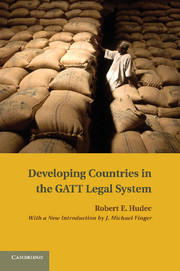Book contents
- Frontmatter
- Contents
- Foreword by Hugh Corbet
- Acknowledgments
- DEVELOPING COUNTRIES IN THE GATT LEGAL SYSTEM
- Introduction to the New Edition
- PART I A HISTORY OF THE LEGAL RELATIONSHIP
- PART II A LEGAL CRITIQUE OF THE GATT'S CURRENT POLICY
- 7 Basic Elements of the Legal Criticism
- 8 Separating Legal and Economic Issues
- 9 Impact of GATT Legal Policy on Internal Decision-making
- 10 Impact on Decisions in Other Governments: Non-reciprocity
- 11 Impact on Decisions in Other Governments: Preferences
- 12 First Steps Towards a Better Legal Policy
- List of References
- Index
9 - Impact of GATT Legal Policy on Internal Decision-making
Published online by Cambridge University Press: 03 May 2011
- Frontmatter
- Contents
- Foreword by Hugh Corbet
- Acknowledgments
- DEVELOPING COUNTRIES IN THE GATT LEGAL SYSTEM
- Introduction to the New Edition
- PART I A HISTORY OF THE LEGAL RELATIONSHIP
- PART II A LEGAL CRITIQUE OF THE GATT'S CURRENT POLICY
- 7 Basic Elements of the Legal Criticism
- 8 Separating Legal and Economic Issues
- 9 Impact of GATT Legal Policy on Internal Decision-making
- 10 Impact on Decisions in Other Governments: Non-reciprocity
- 11 Impact on Decisions in Other Governments: Preferences
- 12 First Steps Towards a Better Legal Policy
- List of References
- Index
Summary
THE PRESENT chapter examines the effect that GATT legal policy has on the decision-making process of the governments of developing countries. The reason for beginning here is the author's conviction that a government's own trade-policy decisions are the most important determinant of its economic welfare. It is here that the GATT's legal policy can make its most important contribution to developing-country welfare or do the greatest harm.
The chapter begins with what might be called a model – a rather lengthy analysis of how the decision-making process of the governments in developed countries is affected by the GATT legal obligations they have accepted. This model is then used to consider how decision-making processes in developing-country governments would be affected by either of two GATT legal policies – (i) the GATT's current no-obligations policy towards developing countries and (ii) an alternative GATT legal policy that would require developing countries to accept roughly the same obligations as developed countries, the alternative sought by most critics. The impact on developing countries will be considered under each of the two contending economic assumptions in this area: that intervention policies are harmful and that they are helpful.
The chapter concludes that the GATT's current policy is harming developing countries more than it is helping them, even under the assumption that developing countries can be helped by infant-industry policies.
- Type
- Chapter
- Information
- Developing Countries in the GATT Legal System , pp. 139 - 153Publisher: Cambridge University PressPrint publication year: 2010

